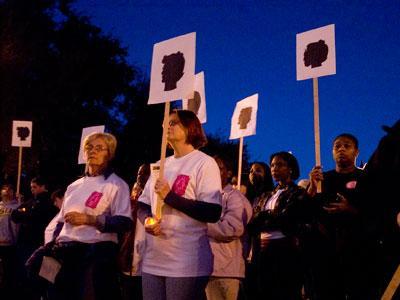Bonita Alston looked like all the other supporters at the “Take Back the Night” event Sunday, listening to music, eating free food and wearing a free event T-shirt, but her reasons for attending were not as similar.Alston is a survivor of domestic abuse. She said she worked as a prostitute in Chicago when she was 15 years old. Alston said she married her pimp, who would beat her regularly, even when she was pregnant.”After that, every man was abusive,” she said. “I thought I was in love. I thought if he didn’t hit me, then he didn’t love me.”Alston was among other victims of domestic violence at the 23rd annual “Take Back the Night,” sponsored by a number of organizations including the LSU Women’s Center, the LSU Student Health Center, the Capital Area Family Violence Intervention Center’s Battered Women’s Program, the Rape Crisis Center and the Office of the Mayor-President.”Thirty years ago, women who were concerned about rape and domestic violence wanted to make a public statement that the nighttime should be safe,” said Martha Forbes, Capital Area Family Center executive director. “[Domestic violence is] a community problem, and we need a community solution.”Louisiana has the highest rate of women killed by men in the nation, according to a September 2009 Violence Policy Center report. The study analyzed data from 2007, which was the most recent data available from the FBI’s Supplementary Homicide Report.Louisiana had a homicide rate of 2.53 per 100,000. Men killed 57 women in Louisiana that year. Nationwide, 1,865 females were murdered by males in single-victim/single-offender incidents in 2007. Ninety-one percent of the female victims were murdered by someone they knew.”Today in East Baton Rouge Parish, 3,600 women are in relationships that are sexually or physically abusive,” Forbes said. In 2008, four forcible sex offenses and four aggravated assault offenses were reported to the LSU Police Department on campus. Two forcible sex offenses were also reported to LSUPD in the residential facilities.Kathy Saichuk, Wellness Education coordinator, said economic stress and alcohol consumption could play a part in Louisiana’s high rate of violence against women.Juan Barthelemy, social work assistant professor who teaches a course on domestic violence, said Louisiana residents are not as inclined to get involved and stop domestic abuse because they are afraid or feel it is none of their business.”When children witness violence against women, and it goes untreated, it teaches them that this is OK,” Barthelemy said. “Some young people develop abusive behaviors toward women, and ladies find themselves in abusive relationships later on because they haven’t learned what a healthy relationship is supposed to look like.”About 250 people gathered from 6 p.m. to 8 p.m. at the Memorial Tower for the event. This year is the second the event has been on campus. East Baton Rouge Parish Mayor-President Kip Holden spoke to the crowd about growing up in an abusive household. The event ended with a 1/2-mile to 1-mile march. The attendees held battery-operated candles in honor of domestic abuse victims and survivors.—-Contact Mary Walker Baus at [email protected]
Victims, supporters march against domestic violence
October 18, 2009







